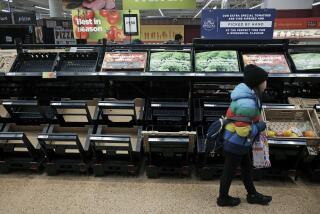Britain moves to curb livestock infection
- Share via
WANBOROUGH, ENGLAND — Britain raced Saturday to avert economic disaster by halting meat and dairy exports and the movement of livestock in the country after foot-and-mouth disease was found on a farm in southern England.
Prime Minister Gordon Brown vowed to work “night and day” to avoid a repeat of a 2001 outbreak, when millions of dead animals were burned, swaths of the countryside closed and British meat shut out of international markets. Rural tourism also diminished.
The Department for Environment, Food and Rural Affairs said Britain had banned the export of live cattle, pigs, sheep and goats, as well as carcasses, meat and milk.
The United States and Japan immediately banned import of British pigs and pork products in response to the outbreak. British beef is already banned in both countries because of fears of mad-cow disease.
The European Union was expected to announce a ban on British livestock imports in the 27-nation bloc when its executive body meets Monday.
British authorities also imposed a nationwide ban on transporting cattle, sheep, goats and pigs.
Foot-and-mouth disease causes fever and blister-like lesions on the mouths, teats and hoofs of affected animals. It can be deadly to livestock but is harmless to humans.
The environment and food agency said animals on a farm near Wanborough, about 30 miles southwest of London, had tested positive for a strain of foot-and-mouth identical to one being studied at a nearby government-funded lab.
Officials said all livestock on the farm were slaughtered and incinerated.
Scientists were trying to determine whether vaccinations could be used to prevent the spread of the disease. The government was criticized for not using vaccines to fight the 2001 epidemic.
Reynolds said it was too soon to determine how far the disease might have spread.
The 2001 outbreak started with a pig herd in northern England and quickly spread to cows and sheep. It eventually infected animals on more than 2,000 farms and shut Britain out of the world’s livestock export markets. The cost to the country was estimated at $16 billion.
It was a year before Britain was declared free of the disease, and months more before exports were allowed to resume.
More to Read
Sign up for Essential California
The most important California stories and recommendations in your inbox every morning.
You may occasionally receive promotional content from the Los Angeles Times.













